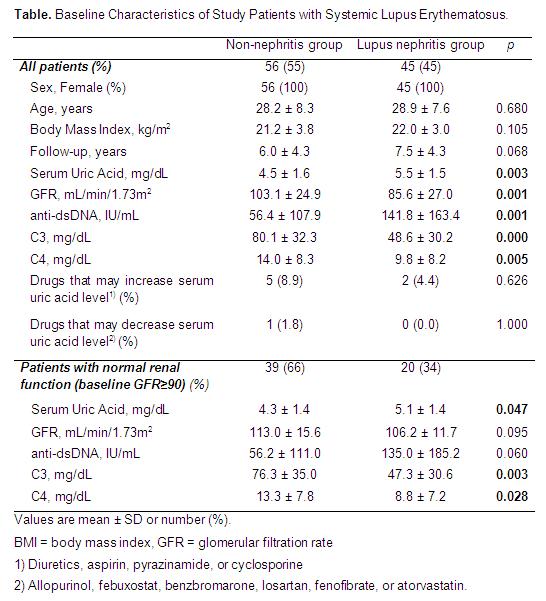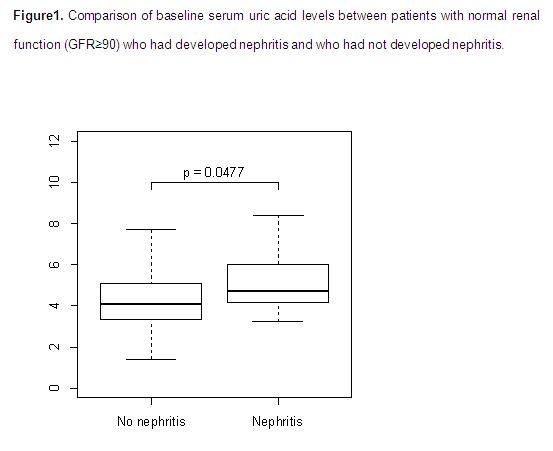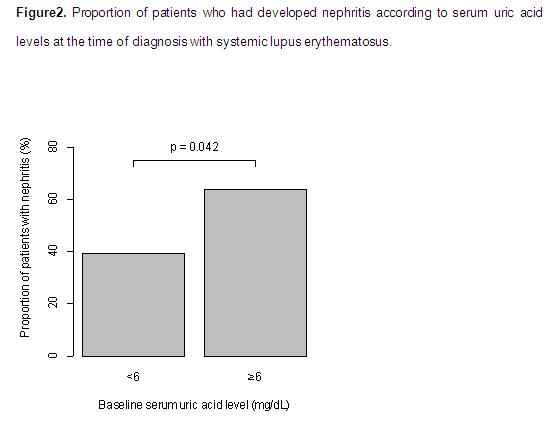Session Information
Date: Sunday, November 5, 2017
Title: Systemic Lupus Erythematosus – Clinical Aspects and Treatment Poster I: Biomarkers and Outcomes
Session Type: ACR Poster Session A
Session Time: 9:00AM-11:00AM
Background/Purpose: Although lupus nephritis is a common and serious manifestation of SLE, there have been few predictive markers for development of lupus nephritis in SLE patients. Serum uric acid level is affected by decreased renal function, besides several factors such as old age, male, menopause, and drugs. However, it is not yet well known whether hyperuricemia is independently associated with lupus nephritis in SLE patients with normal glomerular filtration rate (GFR). The aim of this study was to evaluate the association of baseline serum uric acid level and development of lupus nephritis.
Methods: We retrospectively reviewed electronic medical records of 101 female SLE patients whose ages at the time of diagnosis (baseline) were 45 years old or below in a tertiary medical center from January 2000 to March 2015. SLE with renal involvement was diagnosed when patients met the 2015 ACR/SLICC revised criteria for diagnosis of SLE. We compared baseline serum uric acid levels of the SLE patients who had nephritis at the time of diagnosis or later (nephritis group) with the patients who had not developed nephritis (non-nephritis group) during follow-up period.
Results: Among 101 patients, 22 (22%) had hyperuricemia at baseline and 45 (45%) had developed lupus nephritis during follow-up period (median 6.1 years). There were significant differences in baseline serum uric acid level, GFR, anti-dsDNA antibody and complement level between non-nephritis group and nephritis group (Table). Interestingly, among 59 patients with normal renal function (baseline GFR ¡Ã 90 mL/min/1.73m2), baseline serum uric acid level was also significantly higher in the nephritis group than non-nephritis group (Figure 1). Moreover, the patients with hyperuricemia (uric acid ¡Ã6 mg/dL) at baseline were more likely to develop lupus nephritis than those without hyperuricemia during follow-up period (64% vs. 39%, p = 0.042) (Figure 2).
Conclusion: These findings suggest that high serum uric acid level at the time of diagnosis may be independently associated with lupus nephritis even in SLE patients with normal GFR. More careful evaluation would be required for development of lupus nephritis in hyperuricemic patients.
To cite this abstract in AMA style:
Lim DH, Hong S, Oh JS, Kim YG, Lee CK, Choi SW, Yoo B. Baseline Hyperuricemia As a Predictive Value for Development of Lupus Nephritis in Premenopausal SLE Patients [abstract]. Arthritis Rheumatol. 2017; 69 (suppl 10). https://acrabstracts.org/abstract/baseline-hyperuricemia-as-a-predictive-value-for-development-of-lupus-nephritis-in-premenopausal-sle-patients/. Accessed .« Back to 2017 ACR/ARHP Annual Meeting
ACR Meeting Abstracts - https://acrabstracts.org/abstract/baseline-hyperuricemia-as-a-predictive-value-for-development-of-lupus-nephritis-in-premenopausal-sle-patients/



